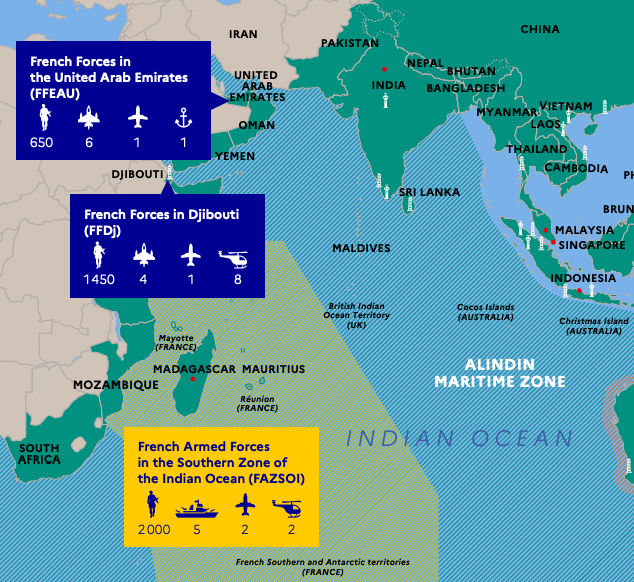France Should Seek its Grandeur in the Indian Ocean
France’s expulsion in 2023 from three of its former colonies in Africa, Burkina Faso, Mali, and Niger, has heightened French anxiety about the country’s place in the world and its aspirations to remain a major global power. An op-ed I published in August of that year under the title “Time’s Up for France in Africa” provoked considerable ire in Paris, particularly among those who cling to the idea of Africa as a theater for France to demonstrate its “grandeur.” One response published in the French foreign affairs magazine Revue Conflits, accused me of being an agent of America’s ambition to push France out of Africa to claim France’s sphere of influence for its own. The article’s claims are absurd for several reasons, among them my impeccable Francophile credentials and the fact that Washington was more than happy to let France take the lead fighting terrorism in the Sahel and has no desire to fill the vacuum the French have left behind. Nonetheless, the article—and the positive responses to it—speaks volumes about French insecurities.
If France needs a project to assert itself on the global stage and make a meaningful difference for global security, the obvious place for France to do so is not Africa but in the Indo-Pacific, more specifically the Indian Ocean.
As surprising as this might be for non-French readers, France is an Indo-Pacific country. Its numerous territories and possessions in both oceans are home to 1.6 million French citizens and make France’s Exclusive Economic Zone the world’s second-largest after the United States. Some of these territories (Mayotte, Reunion) are not just governed by France but integral parts of France itself, just as Hawaii is part of the United States. France also permanently stations ships and troops in the region and regularly sends warships there. France also maintains a large base in Djibouti.
French Forces in the Indian Ocean
Historically, these territories have been an afterthought for France, which has always had more proximate concerns. France’s great 20th-century naval strategist, Admiral Raoul Castex, famously argued in the 1930s that France should sell off its Indo-Pacific possessions. He argued that France could not defend them, and should not be diverting resources away from Europe and its African empire. He saw them as useless liabilities. Today they are commonly derided as “confetti of Empire.” However, now, in the 21st century, thanks to China’s rise and the considerably greater global importance of the entire Indo-Pacific region, they turn out to have real strategic value. Besides, the French are there to stay.
An argument can be made for the importance of any of France’s Indo-Pacific territories. Paris certainly would do well to increase its attention across the board. The strongest arguments, however, can be made for France’s Indian Ocean territories, especially Mayotte and Reunion, both of which are fully-fledged French “departments.” The reasons are multiple. First, the Indian Ocean is relatively neglected by the United States military, whose focus is on China and North Korea in East and South-East Asia. Those areas also are where the larger Asian powers are focused: China, of course, but also Korea, Japan, and Australia, not to mention Vietnam and the Philippines. In this crowded field, French weight is less likely to be felt. Second, La Reunion sits astride a major international shipping route, one that has become more important thanks to Houthi attacks on Red Sea shipping; Mayotte, combined with a scattering of other French-owned islands, gives France control over the Madagascar Channel, also an important commercial shipping route. Finally, the Iranian threat to the Red Sea via the Houthis gives Indian Ocean-based military assets new importance.
The French government in recent years already has made clear in its policy documents that it wishes to enhance its stature as an Indo-Pacific power. In other words, suggesting Paris do more in the region already aligns with France’s stated policy. The problem is that France has not taken actions commensurate with its ambitions. Yes, France has troops (“over 7,000 soldiers”) and ships permanently stationed there. However, the ships are unarmed or very lightly armed patrol vessels, as opposed to frigates or anything with real anti-submarine, anti-ship, or anti-aircraft capabilities. More capable warships and submarines periodically visit the region, but that is not the same thing as basing them there. Moreover, there are no combat or armed maritime patrol aircraft based in the Indo-Pacific. France occasionally deploys a few Rafales for visits to demonstrate that it can. Again, this is not the same thing as stationing them there. At least there is talk of stationing long-range reconnaissance drones, which would make a useful contribution.
In brief, the Indo-Pacific is a region where France can serve its interests by boosting its presence. It is a good place for France to advance its larger goals of asserting its major power status and making a meaningful contribution to global security. Yes, stepping up France’s role in the Indo-Pacific, especially the Indian Ocean, also would serve American interests, but that in no way should detract from the advantages for France.




